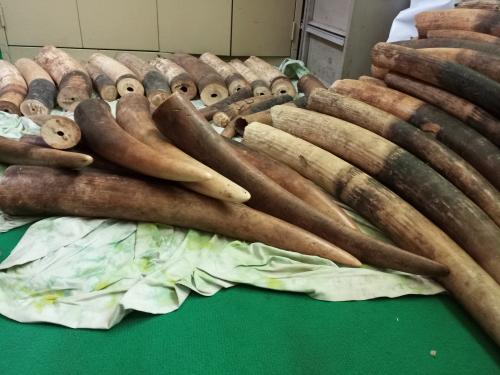Criminal syndicate dismantled: four arrested with ivory and pangolins scales

Four people have been arrested with an estimated 2 tons of pangolin scales and about 200kg of ivory in Douala, during a crackdown operation carried out by a team comprising wildlife and police officers. The four traffickers were found in possession of an illegal consignment of pangolin scales and ivory that was transported in two vehicles. The four were immediately arrested after police checked and found out the contents of the cars.
Following preliminary investigations, it was found out that they are longtime traffickers mostly delivering their illegal products to other traffickers in Nigeria. They used front businesses to cover up of the trafficking in wildlife products. One of them used a telephone shop from where he operated while the another dealt in pepper and a local ingredient that goes by the name “djansang”. Ivory and pangolin scales were hidden inside the pepper and djansang bags when transported.
They activated a huge network of smaller traffickers in towns across the East, Centre and South regions in several towns including Batouri, Messanmena, Ngoyla, Abong Mbang Yoko Ayos. These areas are well known as trafficking centres in the country. The illegal products were stored at the premises of one of the traffickers in Douala before they were moved to Nigeria. A house search that took place at the premises of the main trafficker who kept the illicit cargo found remnants of pangolin scales that littered the several rooms. According to the Littoral Regional Delegate of Forestry and Wildlife “ This is a great victory for us, to have apprehended individuals who illegally exploit wildlife products.”
The trafficking of wildlife products is considered to be the main cause of decline of wildlife species in the country and on the continent. A report published recently by IUCN says an estimated 110 00 African elephants have been decimated by poaching during the last decade. Another report published last year indicate that between 400 000 to 2.7 million pangolins are poached annually in the Central African forests representing a major increase of 150%.
LAGA has been assisting Cameroon’s wildlife ministry to enable them track and arrest wildlife traffickers since 2003.According to the wildlife law that governs the sector in Cameroon, anyone found in possession of parts of a totally protected species is liable to a prison term of 1 to 3 years and or a fine of 3 to 10 million CFA F.
Cameroon is host to 3 species of pangolin, the black-bellied, the white-bellied and the giant pangolins that are all list in the class of totally protected species in the country. Scales from all three species of pangolins were found in the haul.
